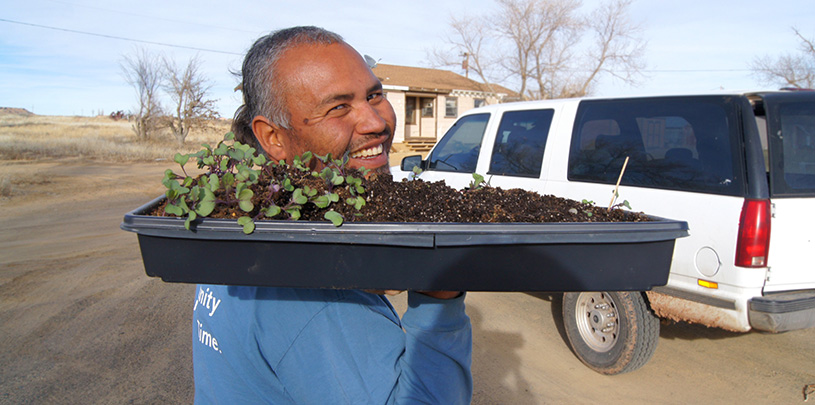
 by Jessica Stago, Native American Economic Initiatives Director
by Jessica Stago, Native American Economic Initiatives Director
The Grand Canyon Trust is proud to partner with Change Labs to help entrepreneurs realize their dreams and build a strong, resilient, and culturally respectful economy across Native America.
In the Navajo language, chi’shie is a funny term that means “to be ashy and dirty,” an apt description for, say, growing vegetables in the dusty southwest corner of the Navajo Nation.
Tyrone Thompson drew inspiration from this humble word and started Chi’shie Farms a year ago, but he’s been working soil, planting seeds, and building hoop houses on the rez for more than a decade, gaining a deep understanding of food and culture through agriculture along the way.
Thompson, his wife Felicia, and their five kids built their homestead in the painted desert near Grand Falls. A passive solar greenhouse is attached to their hogan, where they’ve started over 10,000 seedlings this year, both for their personal garden beds and customers of their community supported agriculture program.
Thompson boasts, “We have thousands of little babies that grow right outside our door.”
Everything comes full circle at Chi’shie Farms. Pigs and red wiggler worms eat the family’s food scraps. The resulting manure and compost fertilize the soil, which in turn feeds the crops that nourish Thompson’s family, friends, and local community. They collect rainwater, use gray water, and harvest food on a daily basis.
“We’re growing things people didn’t think we could,” Thompson says. “Our kids love eating salad greens, which is not something we’ve really practiced as Navajo people. But as we try to do the best we can, we do adopt new ways.”
Thompson sees Chi’shie Farms as a living laboratory. He’s learning to use greenhouses and successional planting rotations to grow food year-round, and he’s expanding beyond the traditional crops of corn, beans, and squash. Thompson grows a variety of flowers, herbs, Asian greens, lettuces, and fruit trees. This year, he’s even experimenting with ginger root.
“Once you start growing food and saving seeds, you are no longer reliant on outside sources. We want to model self-sustainability.”

Thompson, who’s maternal clan is (Tsi’naajinii) Black Streak Wood People and paternal clan is African American, grew up in the Phoenix area surrounded by the Hispanic community. When he moved back to the Navajo Nation in 2005, Spanish would slip out while speaking with elders.
“It was kind of hilarious, but I started to practice my Navajo language. Now it’s difficult for me to speak Spanish, but I can have a conversation with an elder in Navajo. That’s something I’m really proud of.”
Cultural values and teachings are foundational to Chi’shie Farms. Thompson says the planting stick is what grounds Navajo agriculture. In addition to the utilitarian use of poking holes for seeds, planting sticks are also tied to important songs and prayers.
“It’s a weapon to fight off hunger, poverty, and sickness. In a time like this, we go back to our cultural teachings.”
Now that coronavirus has hit the Navajo Nation, Thompson has started making short videos to share on Facebook about how to start seedlings, build self-watering containers, and other DIY gardening ideas.
“I have my kids in intense garden training right now,” Thompson laughs. “Everyone is reconnecting, to the Earth and our families. Hopefully people are starting to plant their gardens.”
Thompson joined the Change Labs business incubator this year and says the program has upgraded Chi’shie Farms from amateur to professional. Admittedly a “hands-on guy,” he struggles with the bookkeeping and record-keeping of running a business. Change Labs has helped Thompson set up systems and navigate complexities of doing agriculture on the rez, like homesite leases and grazing permits.
“They crack the whip and keep me in line in terms of putting away receipts and making sure everything is taken care of.”
Thompson says sometimes the business side of things conflicts with his values.
“We’re not in it for the money. We’re in it to help people. That’s what’s really fulfilling to us.”
Another aspect of Thompson’s business is building hoop houses and green houses for individuals, schools, and chapter houses on Navajo and Hopi lands.
“For us, it’s not about making a million bucks. It’s more about empowering people to grow their own food and have Native communities have healthy, sustainable lifestyles. Our wealth is in our people.”
First-generation jeweler Thomas Deel is back at his jeweler's bench crafting statement pieces out of silver, turquoise, coral, and gold.
Read MoreSummer and LaMandez Brown knew there weren't a lot of jobs on the Navajo reservation. So they made their own.
Read MoreMarisa Mike, a Diné fashion designer, combines traditional styles with contemporary twists in her line of special-occasion wear.
Read More